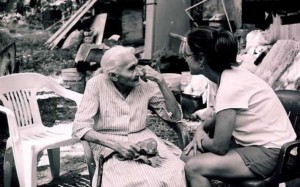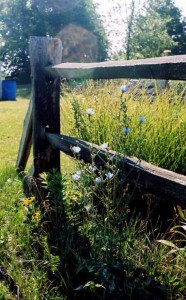Meeting Miss Margaret
Her grandparents were Lovelys. They ran a watermill and sold corn liquor to make their living. Her parents were Ella May Lovely and Charlie Richard Faust, a man she called Papa. She was the youngest of six children and is now the only surviving member of her immediate family. She completed school to the eighth grade at Riverview School and kept her dolls on one of several organs her mother kept in the family room of their modest house. Miss Margaret never married, though she was engaged to a pharmacist who was in the navy. But someone stole him from her.
At 84 years of age, Margaret Faust lives with her two dogs in a tar-paper shack on Island Ford Road, just a few miles outside Lake City, Tennessee. When my two sisters, my mother, and I visited her in July, the larger black dog paced the drive, groaning slightly as if to express his anxiety about four strangers coming so close to Margaret’s front door. I was in Tennessee on a research grant, gathering information about late nineteenth and early twentieth century Appalachian life. When I reserved the little house just down the road from Miss Margaret’s home for our overnight accommodations, the owner suggested I might want to spend some time with this woman. “She sounds just like an elderly version of the female characters in the novel you’re writing!” she exclaimed. She then made arrangements for me to interview Margaret the morning after our arrival. Clearly she had not gotten the dog’s permission to bring a group of strangers up the lane.
 “Well, I’m rattled,” Margaret said several times during our conversation. “But you’re welcome as a flower in May!” She leaned on the neighbor’s arm, her body as bent as the cane she held in her right hand. We circled chairs around her in the dirty yard, trying to keep our feet off the rusting cat food cans and paper trash strewn everywhere. “You won’t want to go in the house,” the neighbor explained before our visit. “She’s a treasure, and you’ll love her from the first minute, but you need to be ready for the way she lives.”
“Well, I’m rattled,” Margaret said several times during our conversation. “But you’re welcome as a flower in May!” She leaned on the neighbor’s arm, her body as bent as the cane she held in her right hand. We circled chairs around her in the dirty yard, trying to keep our feet off the rusting cat food cans and paper trash strewn everywhere. “You won’t want to go in the house,” the neighbor explained before our visit. “She’s a treasure, and you’ll love her from the first minute, but you need to be ready for the way she lives.”
The way Margaret lives is counter to everything I’ve ever known in my own life. Her home, a 10’ by 20’ building nearly hidden by the broken appliances and automobile shells piled around it, has electric power and running water–but just barely. Margaret lives alone, having no husband, children, or grandchildren with whom to share her days or her house. Her clothes were clean, and she held a floppy bonnet in her lap in case the sun broke through the leaves overhead. Her white hair was combed neatly into a braid that reached her waist. And she wore black work boots, like something a man would wear to do farm or construction work.
“If folks see that tape you’re makin’, they’ll think I’m prideful,” she said, concerned that my sister was recording my interview with Margaret. “My people will come,” she shook her head, “and try to take what I got.” From the perspective of my prosperous, mid-western life, I assumed Margaret was afraid someone from the community would see evidence of neglect or depravity in her living conditions. I thought she was afraid someone would steal her independence or try to force into the sterile environment of a nursing home, away from her dogs and her freedom to live as she wanted. Erroneously, I assumed her concern grew out of embarrassment or shame. I was wrong. When I had asked the neighbor if Margaret would be intimidated by the imposition of four curious women, she said no. “The only thing that upsets Margaret is someone else’s attempts to change the way she lives. Yes, it’s awful, but it’s her life to choose.” This woman felt no shame at all about the trash in her yard or the items heaped in stacks inside the house. In her mind, every item has some value, and every item was hers to claim and protect.
Feeling the victim of other people’s deception or ill-will emerged as one of the themes of her life. As we talked, she turned repeatedly to her bitterness over the things that had been taken from her or the fear that her kin were planning to steal everything she had left. I had pursued this conversation with Margaret as an exercise in field research for my novel, a story set in Lee County, Virginia in 1905. I hoped Margaret would be able to tell me about her experiences as a child of Cumberland Mountain. I hoped she would have quaint, sunny stories to share, details long stored like old toys and muslin dresses in the attic of her mind. I hoped to get what I had come for. Looking back on that conversation, I realize I was just another petty thief, greedy to carry off anything truly valuable I could collect while she chattered unaware.
 But Margaret was no easy mark. She answered my questions about her childhood and young adult years with rambling, passionate stories that made very little sense to me. She fixed her attention on the 1950s, even though I kept trying to nose back toward the first three decades of the twentieth century when her parents would have been young adults and she would have lived her early childhood. But she ignored most of my questions, ranting instead about her outrage when the gas company came through to dig trenches across her yard (or was it the electric company coming through to install power lines?), how they disregarded her rights and tore up her property like they owned it. She fumed about a nephew who had come into her house and stolen one of the organs she had inherited from her mother and spoke vaguely about missing jewelry and portions of land sold off by her siblings’ children without her consent.
But Margaret was no easy mark. She answered my questions about her childhood and young adult years with rambling, passionate stories that made very little sense to me. She fixed her attention on the 1950s, even though I kept trying to nose back toward the first three decades of the twentieth century when her parents would have been young adults and she would have lived her early childhood. But she ignored most of my questions, ranting instead about her outrage when the gas company came through to dig trenches across her yard (or was it the electric company coming through to install power lines?), how they disregarded her rights and tore up her property like they owned it. She fumed about a nephew who had come into her house and stolen one of the organs she had inherited from her mother and spoke vaguely about missing jewelry and portions of land sold off by her siblings’ children without her consent.
But she also reminisced about the years she spent fashioning leather gloves and little purses. It really wasn’t clear whether this was a family business or employment in a factory or textile mill, but she repeated again and again the skill with which she manufactured these items, the ache in her fingers, the fragrance and durability of the leather . . . her words stitching her sentences like thin leather laces along the seams.
An hour and half into the interview, the telephone started ringing. When she didn’t rise to answer it, her dog pushed through our chairs and poked his head into her lap, clearly agitated. She couldn’t hear the phone, but the dog could. I touched her arm and said, “Margaret, you’re phone’s rung at least twenty times. Will someone be worried about you if you don’t answer it?”
With the aid of her cane, she went into the house, opening the door only wide enough for her slender frame. We may have been welcome in her yard, but she had no intention of letting us inside her home. Having taken an entire morning with her already, we started collecting our things. The chairs belonged to the neighbor, so we were in the process of stacking them for the return walk when Margaret came out of her house.
“Oh my, no! You ain’t leaving yet. You can’t leave already,” she cried. We had plans to visit the Museum of Appalachia that day, and we were already leaving later than we’d anticipated. In her eagerness to keep us there, she was hurrying. I feared she would stumble, so I took her arm and promised to stay a while longer.
We stayed with Miss Margaret for two and a half hours. She laughed shyly throughout the conversation, covering her mouth when she was truly tickled about something, jabbing the ground with her cane when a memory stirred her outrage. As we rose to leave, I pressed two gifts into her hands: a jar of raspberry preserves and a bundle of peppermint sticks. If I had known about the dogs, I would have brought a box of Milkbones, too.
I had come to gather details for use in my novel, and I hoped to get a clearer impression of the Appalachian voices that for generations have articulated life, loss, and work for families in Tennessee and Virginia. Nothing Margaret told me about her life ended up in my story, but she did help me hear more clearly the music of the dialect spoken by folks who live on Cumberland Mountain. And she gave me a glimpse of who my characters might become if they live long enough to be as old as she is.
On our way to the Museum of Appalachia, we stopped at the cemetery just up the road from her home where she said her people are buried. We found the graves of her mother, father, grandparents, and a couple siblings. I photographed the grave markers and the church beside them. And I have them in an album with the photographs I took of Miss Margaret, her home, her dogs, and all the other treasures I encountered on the trip. My hands were empty but notebook was full when I left her home. Margaret Faust gave me trinkets that I hadn’t asked for and would not have had the sense to steal.



